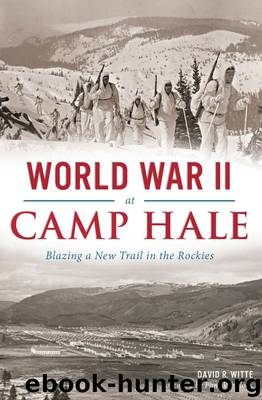World War II at Camp Hale by David R. Witte

Author:David R. Witte
Language: eng
Format: epub
Publisher: The History Press
Published: 2015-02-27T16:00:00+00:00
7
THE WAACS TAKE ON CAMP HALE
Know Your Rank? Better Check Up on Her’s [sic] as Well. 539
—unknown writer, the Camp Hale Ski-Zette, June 2, 1943
The history of the Women’s Army Auxiliary Corps (WAACs) at Camp Hale is one that has never been told in length. This may be due to the fact that there is little primary source information relating to them and their memoirs are few. However, the lack of information about their contributions does not reflect on their impact; they brought much-needed talents and contributions to the cantonment.
The first WAACs marched into Camp Hale in formation on Thursday, May 27, 1943. The 12 women arrived from Fort Des Moines, Iowa, as part of an advanced detail that prepared the way for the arrival of 140 WAACs one week later.540 The U.S. WAAC grew quickly during the middle of 1943 and began staffing offices across the nation. The army rapidly began assigning detachments to posts throughout the country that needed extra administrative and noncombat support. For the WAACs at Camp Hale, this meant settling into an unusual, if not foreign, place for many flatland women who had never seen the Colorado Rockies or even snow.
The WAACs who arrived at Camp Hale quickly realized the unique nature of the cantonment, as one commented after her first week that “it is a bit off the beaten track.”541 Another said it reminded her of “Lost Horizon.”542 Army chow also seemed to be a step down for some women at Camp Hale. One, Mary Stone, commented that it was “S.O.S., you know, shit on a shingle.”543 This did not stop them from settling in and starting their mission of serving soldiers at the country’s highest military cantonment. Their devotion to the war effort easily matched that of the men, as many of the women left defense jobs or businesses that supported the war effort and said goodbye to their families to enlist in the WAAC. The enlistees faced four weeks of basic training, military specific schools, followed all military order and discipline and even had their own physical training regimen; however, they were initially not considered part of the regular army.544
Word quickly spread around Camp Hale that the WAACs—trained in 142 different jobs, including cooks, clerks, librarians, accountants, photographers, bandleaders, special service workers, post exchange workers and ordnance automotive workers—could begin to take over jobs long held by soldiers. The camp command attempted to calm the fears of the mountain troops by reassuring them that the WAACs would not be taking on combat roles or positions that required specific training to the mountain troops. However, this meant that noncombat-related jobs held by men could go to the women, resulting in men being freed up for overseas deployment. At that time, the WAACs had a presence on over eighty posts, camps and stations across the nation and had proven to be essential contributors to the military.545 Soldiers at Camp Hale learned this quickly, as shown by the comments of one soldier, who wrote in the camp newspaper, “Welcome WAAC’s.
Download
This site does not store any files on its server. We only index and link to content provided by other sites. Please contact the content providers to delete copyright contents if any and email us, we'll remove relevant links or contents immediately.
| Africa | Americas |
| Arctic & Antarctica | Asia |
| Australia & Oceania | Europe |
| Middle East | Russia |
| United States | World |
| Ancient Civilizations | Military |
| Historical Study & Educational Resources |
In Cold Blood by Truman Capote(3386)
The Innovators: How a Group of Hackers, Geniuses, and Geeks Created the Digital Revolution by Walter Isaacson(3216)
Steve Jobs by Walter Isaacson(2899)
All the President's Men by Carl Bernstein & Bob Woodward(2379)
Lonely Planet New York City by Lonely Planet(2227)
And the Band Played On by Randy Shilts(2210)
The Room Where It Happened by John Bolton;(2161)
The Poisoner's Handbook by Deborah Blum(2141)
The Innovators by Walter Isaacson(2106)
The Murder of Marilyn Monroe by Jay Margolis(2102)
Lincoln by David Herbert Donald(1991)
Being George Washington by Beck Glenn(1980)
A Colony in a Nation by Chris Hayes(1936)
Under the Banner of Heaven: A Story of Violent Faith by Jon Krakauer(1807)
Amelia Earhart by Doris L. Rich(1699)
The Unsettlers by Mark Sundeen(1692)
Dirt by Bill Buford(1682)
Birdmen by Lawrence Goldstone(1670)
Zeitoun by Dave Eggers(1655)
